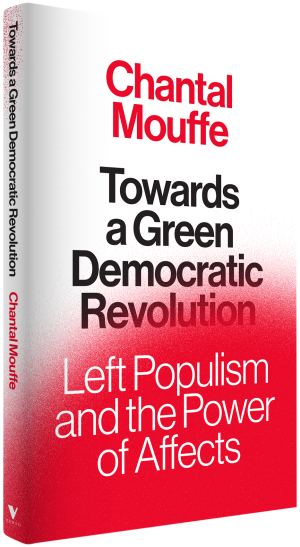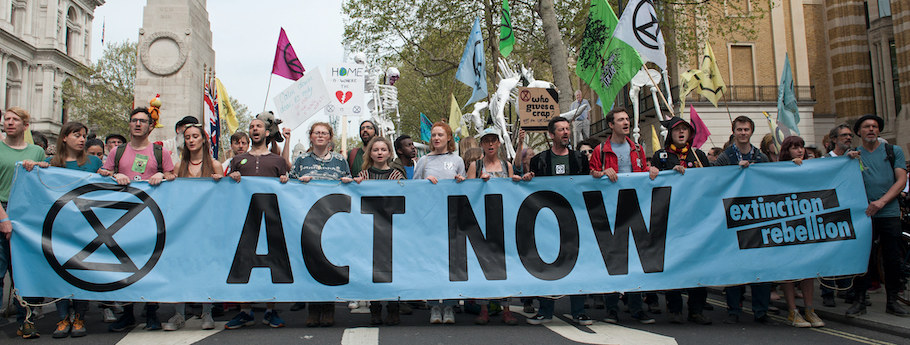
It is a sunny autumnal Sunday afternoon in North West London and I’m sitting with Chantal Mouffe in her back garden, eating quiche and drinking rosé. I am here to find out about her new book: Towards a Green Democratic Revolution: Left Populism and the Power of Affects will come out with Verso Books in a few days.
Mouffe is a celebrated political philosopher, known for her work on populism, radical democracy and political agonism, and for her bold criticisms of rationalist and deliberative approaches to democracy.
She has taught at many universities in Europe, North America and Latin America, and has held research positions at Harvard, Cornell, the University of California, the Princeton Institute for Advanced Study and the Centre National de la Recherche Scientifique in Paris. She is currently professor emeritus of political theory at the Centre for the Study of Democracy at the University of Westminster in London.
Her books have been translated into 18 languages, and include the pathbreaking Hegemony and Socialist Strategy: Towards a Radical Democratic Politics, written together with her late husband Ernesto Laclau. This textboth reflected and challenged the dynamics of the political left in the 1980s, and remains crucial for understanding theories of discourse, hegemony and post-Marxism.
In recent years, Mouffe has become particularly renowned for promoting what she calls ‘a left populist strategy’ which, as she explains in the book For a Left Populism, constructs ‘the people’ in an inclusive and progressive way. Unlike right populism, which generally excludes various social groups, left populism allows immigrants, workers and the LGBTQIA+ community to unite against their common adversary, the ‘oligarchy’. This strategy, she believes, can allow the political left to take advantage of a moment of crisis in the hegemonic neoliberal model and to succeed in establishing a new hegemonic formation.
From her garden we can hear the muffled sounds of urban life in West Hampstead, children playing and neighbours chatting. Mouffe tells me that, although she has been based here for years, London is not her favourite city – one of the reasons for staying is the vast amount of books she would have to move if she decided to relocate in Paris or Vienna. She is as open and generous and razor sharp as ever and we talk about Greta Thunberg, the Russia-Ukraine war and British politics before I finally get around to asking her about her new book.
Chantal Mouffe (CM): Something I wanted to do in the book was to examine the conjuncture in which we find ourselves today, in comparison to the conjuncture that existed when I wrote For a Left Populism. There have been important changes since then – the pandemic for example. But I argue that even if the conjuncture is different, the strategy of left populism is still the most adequate strategy for the political left. It has been argued that left populism only worked at a particular moment, and that ultimately it failed and that we should go back to a traditional left strategy around classes.
Yes, of course, things have changed, and many of the movements that I was presenting in For a Left Populism have faced setbacks, and never fully achieved their aims. But this does not mean that the whole strategy doesn’t work, just that it needs to be adapted to the new conjuncture.
Something else I wanted to discuss in the book is the question of whether it was true that the pandemic has precipitated us into a ‘post-neoliberal’ era. Some argued, at least at the time, that the pandemic crisis exposed the limits of neoliberalism, since neoliberal policies prevented societies from being able to cope. Some people thought we would see very important changes, but others argued that it would be business as usual. In reality, we have not seen any drastic changes.
Amanda Machin (AM): Was this necessarily the case? Does crisis mark a moment, a turning point, at which things can change? I’m interested in whether crisis marks a moment or rupture or if it works to depoliticise issues. How do you see ‘crisis’?
CM: Crisis can be constructed in different ways… But in this case, contrary to people who believed that this is something that is going to be final for neoliberalism, I’m afraid that this crisis was a moment for neoliberalism simply to ‘buy time’. My argument is that the pandemic opened the way for a new form of neoliberalism – an authoritarian form. There were already authoritarian tendencies in place, for example the response to the Yellow Vests movement. The pandemic further legitimised those tendencies.

[© R. Bodegraven]
The impact of the pandemic has been to generate a feeling of vulnerability and a widespread demand for protection and security. This is something that is being used, mobilised, by the right, who are claiming that they will provide protection. And people are accepting a measure of control that they didn’t accept before. So a central argument in the book is that the left need to understand this demand for security. A left populist strategy today must provide people with security and protection. But it is important to articulate that in a way that asks for more democracy, in contrast to the populist right and its authoritarian approach.
AM: You refer more particularly to the rise of ‘authoritarian digital neoliberalism’. Can you explain what you mean by this?
CM: Well, consider the way that healthcare now works through the operation of digital technologies. This was happening already before the pandemic, but the pandemic policies accelerated and legitimised this tendency. This form of control is now being expanded into other areas – education for example. We are being governed more and more by algorithms.
AM: ‘Digitalisation’ is being widely championed. Did you think about the way that this seems to contradict the aims of sustainability, which are also promoted? Moving to a form of digital governance is very energy intensive. I find it quite striking that this contradiction between strategies of digitalisation and sustainability is not widely discussed…
CM: Oh, this is a contradiction that we see everywhere – people are very inconsistent, they have their smartphones, yet they vote green, there is something quite absurd about it. But I’m also guilty of such inconsistency, I use Amazon for example; because of the pandemic, I couldn’t get French books any more, and I realised that I could get them delivered the next day by Amazon. Still, awareness of climate change has grown, partly due to the mobilisation of the youth. We’ve become more aware of the climate question and it has now taken on an urgency.
You were interested in those questions well before me. Well, I was interested, in Hegemony and Socialist Strategy we discuss environmentalism. But previously it was very theoretical for me, now it is existential. Today we need to take account of socioeconomic crisis, the sanitary crisis but also the climate crisis. Climate change must be addressed in a democratic way. It requires a break with neoliberalism and financial capitalism. That is the problem as I see it with ecological parties: they don’t call for a rupture with neoliberalism.
AM: Yes, many green parties and movements are trying to include everyone; they want a consensus on climate change.
CM: Exactly, they don’t accept there is an adversary. They tend to be attached to what I call the ‘associative’ model of democracy that accepts pluralism, but ignores the role of conflict in forming political collective identifications. In tackling climate change we need to accept an adversary. The strength of left populism is that it establishes a frontier and realises that there is an adversary. And that is crucial if we want to deal with climate change.
AM: Isn’t this a problem of turning political issues into moral issues – as you point out in your previous work? Green capitalism seems to me to be a way of making a political issue into an economicissue. On the other hand, there is another tendency to see climate change as a matter of ethics. I have argued that, because of the disagreement and passions around climate change, it provides a possible impetus or ‘tragic opportunity’ for democracy. People who wouldn’t normally participate in politics get involved and form coalitions. Would you agree with that?
CM: Yes, and this is precisely why a left populist strategy is relevant, because it mobilises a coalition who can demand what I call ‘a radical ecological bifurcation’, by which I mean a rupture with financial capitalism.

In the last chapter of my new book, I point out that the climate movement must be politicised. I explain that in order to deal with climate change we need good policies, but that is not enough; there must be desire for policies. And this is why the role of affects is important. It is important to create an imaginary that can motivate people. And this imaginary should allow people to see the importance of ecological bifurcation as a new stage of democratic revolution. So people will feel empowered to find a better life. The worst approach to climate politics is a punitive one.
AM: You mean the approach that says you are somehow a bad person if you don’t recycle and so on?
CM: Exactly, it is important to inspire, to deploy a left populist strategy that can constitute a ‘people’ from a diverse population. In an earlier piece I wrote for Open Democracy I referred to green ‘transformation’, and I decided to change it to ‘revolution’. I thought initially that this was too Bolshevik, but I think we need this strong signifier that can activate the democratic imagination. The Green New Deal, I think, doesn’t work as a signifier in Europe, it is too closely associated with the European Green Deal.
AM: The language of the European Green Deal, like the discourses around the European Union in general, is very dry. As Yannis Stavrakakis points out, these discourses don’t have the ‘stickiness’ of populist discourse for example. Actually, this leads to a question that I’ve wanted to ask you for a while. You argue convincingly that it is not enough to have a good programme, that parties of the left have to engage passions. How does that process work? Does it happen spontaneously? Or is it a deliberate strategy? And isn’t that itself rational? How do parties of the left engage affects?
CM: Well, look, in the book I give an answer to that when I compare the political party strategies during the last UK General Election in 2019. The Tories had no programme at all, but only the slogans ‘Get Brexit Done!’ and ‘Take Back Control!’ that made voters feel empowered. On the other side, the Labour party had a full programme, but they were saying ‘vote for us and we’ll do that for you’ as if citizens were clients. The programme was presented in such a way that they did not empower people, it put them in a passive role.
Policies are important but they aren’t enough: left parties need a narrative as well as a programme. They need to take into account the role of passions, and by ‘passions’ I don’t mean individual emotion, I mean the type of common affects that will help to create a bond between people. This is what I think is important. This is why I promote ‘the democratic revolution’. The democratic imaginary is key in our societies. As I explain in the book, we are not going to mobilise people by talking about ‘socialism’, but rather by using the signifier ‘democracy’. Think about the Black Lives Matter, Occupy and Indignados movements – in our European imaginary, the signifier ‘democracy’ continues to resonate.
AM: Isn’t there a growing awareness in political theory circles that, for communities in some parts of the world, the signifier ‘democracy’ goes along with exploitation and colonialism?
CM: But exactly, my argument is an argument for Western Europe. I’m not trying to universalise it.
AM: How does that work in relation to climate change politics?
CM: Indigenous communities are already aware of climate change. For them this issue doesn’t need to be brought forward, it is already there as an existential matter. They are already mobilised and they already have a different – and very complicated – relation with respect to what we call ‘nature’, which for them is not necessarily separate from human society. I really like the work of anthropologist Philippe Descola on this. We have a lot to learn from indigenous communities. For me the question is how can we mobilise people here, in western Europe, around the issue of climate change.
AM: I have a question about that. You mention bringing in the non-human into a political chain of equivalence, or, in other words, forming a strong coalition of various demands from an array of different groups, that can unite against a common adversary. But shouldn’t we be suspicious of claims about representing and listening to non-humans? Isn’t any such claim to know the interests or perspectives of nature or future generations rather an expression of power? Can nature truly be ‘represented’?
CM: Bruno Latour used to speak of a ‘Parliament of Things’ and this raised the question of how this can be envisaged, for example, by granting rights to rivers and so on. I was very much against this idea, I thought this didn’t make sense: rights imply obligations and so on, but now I’ve changed my mind, rights in that context are really meant as metaphors. The right of a river simply means that the river is not just here for us, as if we were masters of the universe. We need to become aware of our own dependence on nature. We need to introduce a reflection on the Anthropocene.
AM: Final question: do you have a new book planned?
CM: Absolutely not! I have some ideas for articles but no new books for a while.
_______________________
ABOUT THE INTERVIEWER
Amanda Machin is associate professor of political sociology at the department of Sociology and Social Work at the University of Agder, Norway. She is the author of Negotiating Climate Change: Radical Democracy and the Illusion of Consensus (Zed Books, 2013), Against Political Compromise: Sustaining Democratic Debate (with Alexander Ruser, Routledge, 2017), Society and Climate: Transformations and Challenges (with Nico Stehr, World Scientific, 2020) and Bodies of Democracy: Modes of Embodied Politics (Transcript, 2022). Together with Marcel Wissenburg, she is currently editing the Handbook of Environmental Political Theory in the Anthropocene for Edward Elgar.
The views expressed in this article are those of the authors and do not necessarily reflect Democracy in Action’s editorial stance, or the position of any institution or association.
